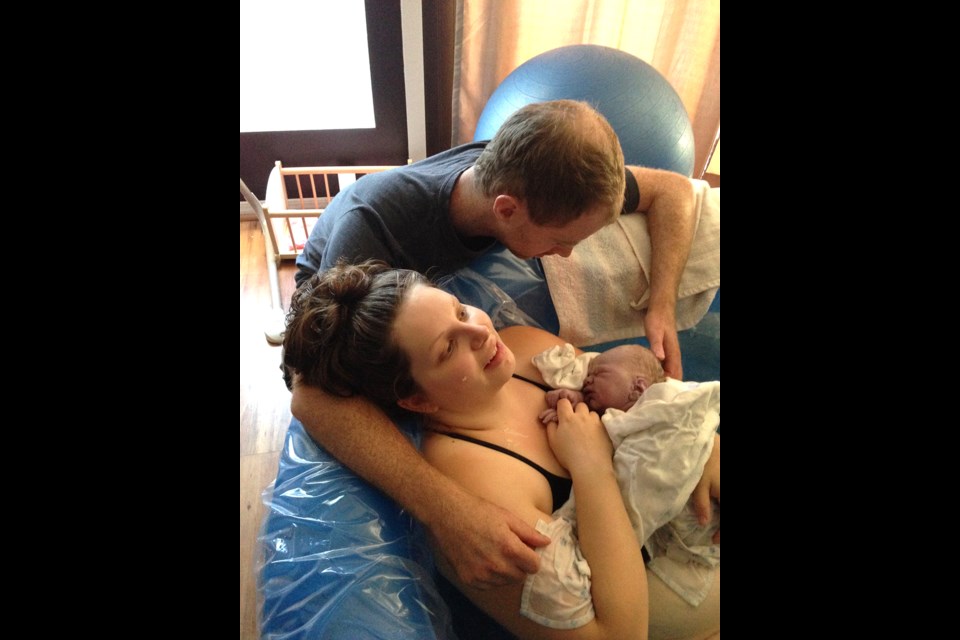After two opposite birthing experiences, Squamish mom Kati McGaw highly recommends home births.
She had a hospital birth for her daughter in 2012 and a home birth with her son in 2014, both in Squamish and both with registered midwives.
Although the staff at Squamish General Hospital was kind and supportive, she said being in the hospital for her first child was stressful.
“I just wasn’t relaxed,” said McGaw.
It took 32 hours to deliver her daughter.
Two years later, she opted for a home birth with midwives.
The whole process from start to finish was more pleasant, she said.
“It was really nice with the home birth that I woke up at 4 a.m. with full-on contractions and just hopped in the bath, my daughter was sleeping and my husband I let sleep,” she said. At 6 a.m. she called her midwives, who arrived within 10 minutes. Her son came into the world two hours later.
She said she wasn’t anxious about anything going wrong during the home birth.
“I knew that anything my midwives could do at the hospital they could also do at home,” McGaw said.
About 70 per cent of births attended by midwives in B.C. take place in hospitals, according to data from the Midwives Association of B.C.
Midwife Lydia Szymanski said about 25 to 30 per cent of clients at Squamish’s Roots Community Midwives clinic plan home births.
Beyond being more comfortable and relaxing for mom, home births are more economical for society, McGaw said.
The provincial government covers all midwifery care for women with a B.C. health card.
“It is going to lower our taxes – it is going to create less of an emergency wait for patients and create more hospital beds for people who actually need them,” she said.
New research backs up McGaw’s points.
A recent UBC study found that planned home births between 2001 and 2004 saved $2,541 compared with planned hospital births with a physician, and a home birth with midwives saved an average $2,338 compared with a planned hospital birth with a midwife.
“Cost savings are associated with the place of birth,” Patricia Janssen, the report’s author and a professor in the School of Population and Public Health at UBC, said in a news release. “It just makes sense that if you have a home birth, you’re not paying hospital charges.”
The study also found that the health-care expenses for a baby born at home during its first year were $1,146 less than those for physician-attended hospital babies and $810 less than those for babies born in hospital with a midwife.
Janssen said this lower health-care cost in the first year reflects the safety of planned home births.
“If there were ‘hidden’ health risks associated with planned home births, such as a brain injury diagnosed after the neonatal period, these risks would show up in costs to the health care system, and we are not seeing them,” she said in the release.
This study expands on Janssen’s previous research that found planned home births by low risk women resulted in fewer interventions and similar rates of negative outcomes when compared to planned hospital births.
None of this is news to Kimberly Daniels, a doula and mom who gave birth to her son at home.
“It makes sense,” she said, of both the economy and safety of home births.
A midwife is the medical care provider and the doula is the emotional, physical, information support, Daniels explained. Doulas work as part of a birthing team with midwives.
She said a home birth provides a more quiet and gentle introduction to the world for babies and a more comfortable environment for partners and families.
So far this year, Daniels has assisted in 19 births; 10 of those were home births, she said..
“It is always an honour, it is a new person coming into the world, and the family invites you to be there with them so it’s a privilege and an honour every single time,” she said.
Ultimately Daniels said how a mother chooses to give birth is not about right or wrong: It is about understanding options.
“Informed choice leads to families feeling more empowered about their births which then leads to feeling more confident moving forward as new parents,” she said



